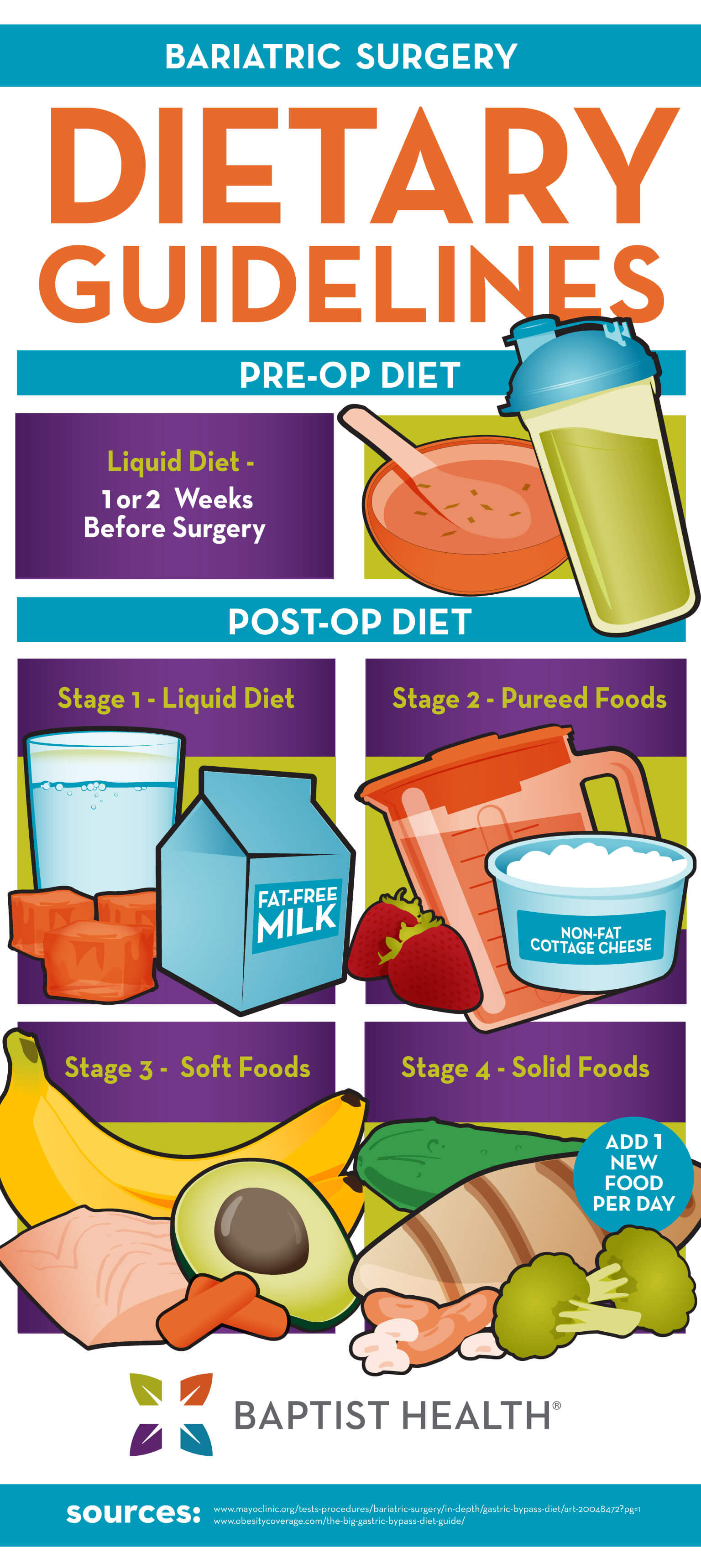Gastric Bypass Diet: Pre and Post Op Bariatric Weight-loss Surgery Meal Plans

Bariatric surgery is a big step in the right direction for substantial weight loss. However, surgery alone isn’t enough to ensure long-term success. Adhering to a proper bariatric diet before and after your surgery is key to an optimal patient outcome.
What is a Bariatric Diet Plan?
A bariatric diet is designed to allow your stomach to heal without being stretched by the food you eat. In addition, it will enable a transition to get used to eating the smaller amounts of food that your smaller stomach can comfortably and safely digest.
Your Baptist Health surgeon will discuss with you the particulars of your individualized pre-op and post-op gastric bypass diet. But the guidelines below will give you a good idea of what to expect prior to and following bariatric surgery.
Pre-Op Bariatric Diet
The purpose of a pre-bariatric surgery diet is to reduce fat around the liver so that your surgeon can see and navigate your anatomy during the operation.
Should you decide to violate the diet plan, surgery may be delayed or canceled intra-operatively (during the procedure).
Now is not the time to binge or indulge in one last hurrah. You’ve likely waited six months to a year to be approved for surgery, and failing to comply with your pre-op diet will set you back. It’s just not worth it in the long run.
Pre-Bariatric Surgery Diet Plan Guidelines
The typical pre-op gastric bypass diet is high in protein and low in fat and carbohydrates. You will consume 70 to 120 grams of protein a day. Pre-op diet plans range from 800 to 1200 calories a day and will likely include the directions and foods below:
- If you smoke, quit now.
- Avoid alcoholic beverages.
- No sugary beverages.
- No caffeinated or carbonated beverages.
- Don’t binge eat.
- Sip beverages and liquids slowly.
- Do not drink with meals.
- Wait at least 30 minutes after a meal before consuming any liquid.
- If your surgeon or practitioner approves, one or two daily servings of lean meat or vegetables may be allowed.
Bariatric Pre-Op Liquid Diet
- Protein and meal replacement shakes will comprise the bulk of your pre-op diet.
- Soup broth with no solids may be consumed.
- Vegetable juice, but not fruit juice, is permitted.
- Extremely thin cream of wheat or cream of rice can be eaten.
Post-Op Bariatric Diet
Once your operation has been performed, your stomach will need to heal. What and how you eat will be a determining factor in how well and how quickly you recover. Your post-op diet will prevent your stomach from stretching and putting undue stress on your body. It’ll also help you get used to your long-term diet after gastric bypass surgery and eating smaller amounts, help with initial weight loss and help avoid side effects and complications from surgery.
The first five weeks after bariatric surgery will be the most vital and the most challenging. Your post-op diet after gastric bypass surgery will unfold in stages until you’re able to tolerate solid foods. Establishing a new, healthy bariatric diet will be integral to maintaining weight loss success throughout the rest of your life.
Stage 1 Bariatric Diet: Liquids (1 Week)
Your provider will probably recommend and allow you to consume the following liquids as an immediate post-bariatric meal plan:
- Water
- Fat-free milk
- Fat-free broth
- Sugar-free jello
- Decaf tea or coffee
- Strained cream soup
- Unsweetened juice
Stage 2 Bariatric Diet: Pureed Foods (2 Weeks)
During this stage of your bariatric meal plan, you will eat foods that have the consistency of a smooth paste or thick liquid. You’ll still want to consume high amounts of protein and the recommended daily 64 oz. of water. Multiple small meals throughout the day will be substituted for three larger meals, due to the diminished capacity of your post-surgery stomach.
- No caffeinated or carbonated drinks
- Protein shakes
- Egg whites
- Non-fat soft cheese
- Non-fat cottage cheese
- Soft fruits and cooked vegetables
Puree or blend solid foods with one of these approved liquids:
- Water
- Skim milk
- Broth
- Juice with no sugar added
Stage 3 Bariatric Diet: Soft Foods (2 Weeks)
Anything that can be easily mashed with a fork is considered a soft food, but that doesn’t mean you can eat whatever you want as long as it’s soft. Stage 3 of your post-gastric bypass meal plan continues the focus on lean, high-protein foods with the gradual introduction of more fruits and vegetables. Stage 3 bariatric diets often include:
Proteins
- Lean chicken
- Lean turkey
- Fish
- Egg whites
- Non-fat cottage cheese
- Non-fat cheese
- Tofu
Vegetables
- Potatoes
- Carrots
- Green Beans
- Tomatoes
- Squash
- Cucumbers
- Bananas
- Avocados
Stage 4 Bariatric Diet: Solid Foods
Once you’re able to tolerate soft foods, you may begin integrating firmer foods into your post-bariatric meal plan. You’ll want to chop or dice foods and start slowly to see how your body responds. It’s recommended that you only add one new food per day to accurately assess your body’s reaction. You may find that you have difficulty with dairy products or spicy foods.
Stage 4 of your bariatric diet carries over the high-protein requirements and daily intake of 64 oz. of water for proper hydration.
Foods to Avoid in Stage 4
Though solid foods are reintroduced at this stage, there are certain foods you can’t eat after gastric bypass surgery, including:
- Refined sugar
- High carbohydrate foods
- Nuts and seeds
- Popcorn
- Dried fruits
- Carbonated beverages
- Granola
- Fibrous vegetables like celery, broccoli, corn and cabbage
- Fried foods
- Breads and whole grains
- Beef
- Pork
- Shellfish
- Grapes
- Beans
At each and every stage of this diet, you’ll want to keep a few things in mind. Be sure to eat and drink slowly, keep your meals small, drink plenty of water between meals, chew thoroughly, focus on high-protein foods and avoid foods with high fat and sugar content.
Learn More About Bariatric Diets with Baptist Health
Again, the above guidelines are just that: guidelines. Your surgeon and/or provider will develop an individual plan for you to follow. The important takeaway is that you stay with your plan, however, your doctor designs it, to get the most out of your bariatric surgery. Learn more about Bariatric Care & Weight Loss Management at Baptist Health.



